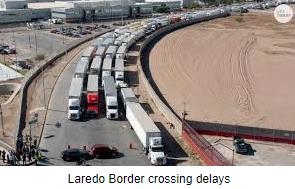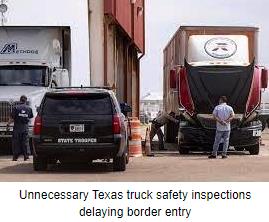 On September 20th, Governor Greg Abbott imposed a mandatory safety check on all semis crossing into the U.S. from Mexico at major border points of entry. The Texas Department of Public Safety was incapable of conducting brake and other safety inspections at a rate that would allow constant passage of vehicles and their northbound cargos. Delays exceeding a day were encountered, disrupting the flow of transport. The action by Texas added to cost and created a problem for manufacturers using just-in-time inventory control systems. Although the misdirected and mischievous program of obstruction was cancelled, following both diplomatic and industry intercession, it is estimated that 19,000 trucks carrying $1.9 billion in goods were delayed. Manufacturers and trucking companies on both sides of the Southern border are resolving backlogs in transport.
On September 20th, Governor Greg Abbott imposed a mandatory safety check on all semis crossing into the U.S. from Mexico at major border points of entry. The Texas Department of Public Safety was incapable of conducting brake and other safety inspections at a rate that would allow constant passage of vehicles and their northbound cargos. Delays exceeding a day were encountered, disrupting the flow of transport. The action by Texas added to cost and created a problem for manufacturers using just-in-time inventory control systems. Although the misdirected and mischievous program of obstruction was cancelled, following both diplomatic and industry intercession, it is estimated that 19,000 trucks carrying $1.9 billion in goods were delayed. Manufacturers and trucking companies on both sides of the Southern border are resolving backlogs in transport.
The action by Governor Abbott was in essence “Border Theater” intended to enhance his image since it had no effect on deterring illegal immigration. Department of Public Safety inspectors had no authority beyond assessing roadworthiness. They did not open trailers to inspect for contraband or trafficked migrants.
The diversion of customs agents to immigration duty in response to the migrant surge is an added complication contributing to delays at border crossing points in both Texas and Arizona. During the second weekend in October, pedestrian crossing was delayed four-fold from the normal one hour wait.
 Deploying additional DHS agents to the border, extending barriers by incremental lengths and implementing periodic photo-op gestures will not resolve the mounting problem that cannot be blamed on any of four successive administrations. The U.S. requires a rational, practical and comprehensive immigration program and a complementary guest worker scheme. This will require bipartisan cooperation in Congress. This is a commodity in short supply in both chambers of the legislature, reflecting a polarized electorate.
Deploying additional DHS agents to the border, extending barriers by incremental lengths and implementing periodic photo-op gestures will not resolve the mounting problem that cannot be blamed on any of four successive administrations. The U.S. requires a rational, practical and comprehensive immigration program and a complementary guest worker scheme. This will require bipartisan cooperation in Congress. This is a commodity in short supply in both chambers of the legislature, reflecting a polarized electorate.